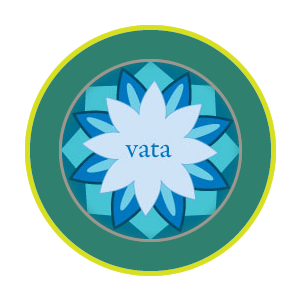Before beginning to explain about how to reduce or pacify the Vata dosha, you may want to read about
Tridoshas, and Tridoshic Recipes if you have not already.
| Balance – Vata | Imbalance – Vata | |
|---|---|---|
| Follow a daily routine as regards to time of meals, number of meals, time to and from bed, exercise, relaxing | Never follow any routine, eat meals at different times, going to bed late (after 11:00 pm), sleep during the daytime | |
| Eat warm cooked meals that are a little oil, not dry | Eat raw vegetables, rice cakes, lots of beans, popcorn, soft drinks, chips, munching all the time, skip meals. | |
| Warm oil massage | Travel -especially by airplane | |
| Live in a warm and moist climate were you can get fresh air and sunshine | Live in a desert or high mountains where cold and wind increases the effect | |
| Wear clothing that is warm color such as red, orange, yellow or a calming color like green | Wear clothing that creates lightness in the body such as purple, blue and white | |
| For leisure time choose calming activities such as quiet walks in nature or parks | For leisure time do stimulating activities, amusement parks, discos, rock concert |
Vata Pacifying (reducing) Food List
Grains: White basmati rice, wheat, barley, rye, amaranth, oats,
quinoa
Vegetables: Juicy, sweet veggies are the best like zucchini, asparagus, beets, carrots, cauliflower, cilantro, cucumber, fennel, garlic, green beans, green chilies, leeks, mustard
greens, olives (black), onions, parsnip, peas, sweet potatoes, sweet corn, pumpkins, radishes (cooked), squashes, watercress
Legumes: Mung beans, aduki beans, red & yellow dal, tur & urad dal, must be cooked properly.
Spices: Most spices are good for Vata; however, one should avoid using hot, pungent, drying spices in excess, cumin, coriander, fennel, turmeric, hing
Fruits: Sweet and sour tastes like grapes, grapefruit, lemons, limes, oranges, pears, bananas, cherries, dates, figs, apples (cooked), apricots, avocados, berries, oranges
Dairy: Fresh whole milk, ghee, butter and soft cheeses.
Meats: Some meats are good for Vata like white meat chicken and fish should be baked or broiled, or chicken soup.
Nuts: All nuts, particularly almonds limited to two a day
Oils: Ghee, sesame, olive, peanut.
Comment: A strictly Vata pacifying diet is rarely used. It is only for debilitated patients or conditions where gaining weight is critically needed. A milder Vata diet can be used by many where there is colder, drier climate and when the season is fall or winter.






